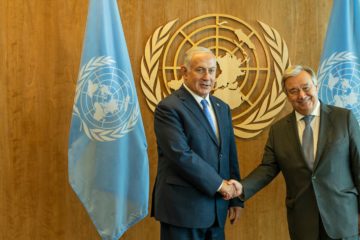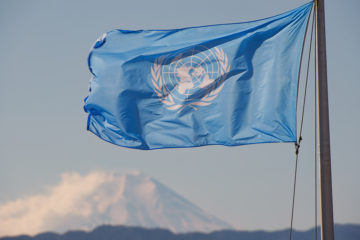
Gang-leader “Barbecue” is Haiti’s “Bane”. But is there a “Dark Knight” to restore the country’s stability?
The unfolding events in Haiti are reminiscent of the American superhero film, “The Dark Knight Rises”. The key distinction between the Caribbean country and the final chapter of Christopher Nolan’s Batman trilogy is that, so far, no superhero has emerged. In the film, Bane, Batman’s main antagonist, orchestrates chaos and upheaval in the crime-ridden Gotham City by releasing criminals from prison. Portrayed as a symbol of anarchy, Bane exploits societal divisions by mobilizing the disenfranchised against Gotham’s corrupt social order. Meanwhile, Batman, depicted as the “Dark Knight”, emerges as a beacon of hope and justice, collaborating with Gotham City’s remaining police force to resist the Super-Villain Bane’s destructive agenda and restore stability to the city. Haiti’s Gang Insurrection Today, Haiti’s …

Breaking the Domino Effect: How the West Should Respond to Niger’s Coup
On 26 July, Niger’s presidential guard launched a coup against President Mohamed Bazoum, announcing their seizure of power in a televised broadcast. As the dust of the coup begins to settle, Niger — and the international community — stand at a crossroads. The military junta’s success in maintaining power is far from guaranteed and has been widely condemned. Several states and supranational organisations, including the US, France, the EU, the Economic Community of West African States (ECOWAS), and the African Union (AU) have threatened the military junta with sanctions if it does not reinstate President Bazoum, and have even considered military intervention. However, the Sahel’s track record of successful coups suggests that Niger is likely to see further democratic backsliding, …
Why Police Reform Won’t Do the Trick in Colombia
Times are grim for human rights and the rule of law in Colombia. Since the end of April, tens of thousands of Colombians have taken to the streets after President Iván Duque announced a controversial tax reform. While the government has withdrawn the reform proposal, protests are ongoing as citizens express their frustration over structural inequalities. Discontent is high across the country, especially among lower- and middle-class Colombians who have experienced increased hardship while enduring the COVID-19 pandemic. By 22 June, 83 people were killed and over 1,600 wounded, with much of the violence attributed to the Colombian National Police. The police’s anti-riot unit, known as ESMAD, has become a symbol of disproportionate policing based on the excessive use of force. The Constitution …
OxPol Blogcast Episode 5: Biden’s North Korea Policy
Welcome to the OxPol Blogcast, a podcast where we will be sharing research, analysis, and experiences from members of the University of Oxford’s Department of Politics and International Relations. On each, episode we will talk to a guest about a piece they’ve written for the OxPol Blog. Then, we’ll discuss their larger research agenda, their insights on conducting political science, and their time at Oxford. On this episode of the OxPol BlogCast, host Chase Harrison talks to Stipendiary Lecturer in Politics Edward Howell about Biden’s policy on North Korea, regional relations around the Korean Peninsula, and exact you conducts research on a notoriously closed off country like North Korea. Read the original blog post here: https://blog.politics.ox.ac.uk/washington-and-pyongyang-back-to-square-one/
A Pivot to Prevention? The UK’s New Approach to Conflict and the Integrated Review
Until now, the UK’s prevailing approach to global conflict and mass atrocities has been one of response and of firefighting. As a result, it too often resulted in missed opportunities to help mitigate harms. Whether in Rakhine in Myanmar in 2017, in Central African Republic in 2014, or Syria in 2011, the window of opportunity to help vulnerable populations closed before the UK had properly recognised the trajectory of violence. There is much to pick through, question, and challenge when reading the new vision for the UK’s international policy as set out in the outcomes document of the year-long Integrated Review of Defence, Development and Diplomacy published by Her Majesty’s Government on Tuesday. But—and particularly with regards to conflict, stability …

‘Uniting for Peace’ Against Israel’s Annexation Plan
With the diversion of Israel’s military resources towards West Bank, Israeli annexation of occupied Palestinian territory appears imminent, pending approval from and coordination with the American administration. Struggling to rally right-wing voters amidst the fight for his political survival in the elections of April, September 2019 and March 2020, Prime Minister Benjamin Netanyahu had stated that he would “apply Israeli sovereignty” over the West Bank, if re-elected. Bolstered by the reversal of decades of American policy on the issue and the subsequent release of Trump’s much criticized, one-sided ‘Middle East Peace Plan’ in January 2020, Netanyahu has aggressively pursued the annexation agenda with the emergency government formed with Benny Gantz in March 2020. Considering the expected blockage of the Security …
The Ineffective International Response to the Rohingya Crisis ─ A Paradox
The longstanding Rohingya crisis in Myanmar has generated massive human rights violations, becoming a humanitarian disaster. It is not only an internal matter for Myanmar, as it has destabilized the regional tranquility of South and Southeast Asia and triggered a global outcry. In this article, I will illustrate why major states, such as China, India, Russia, and the US, have adopted a policy of overlooking the Rohingya crisis. I have intentionally excluded the potential for a prominent leadership role from the already fragile Muslim world because of both their general absence from the central world leadership and their preoccupation with their own domestic crises. The Rohingya are the largest community among eight prominent Muslim groups in Myanmar and have lived in its Rakhine State (formerly Arakan) for generations. They are envisaged by the nation’s government and Buddhist population as illegal Bengali immigrants who came from what is …

Book Review: Richard Caplan’s “Measuring Peace: Principles, Practices and Politics”
In Measuring Peace, Professor Richard Caplan of the University of Oxford has written an insightful guide for students and practitioners of peace. The book will help those who want to understand the fundamental principles and existing practices of how to assess peace while at the same time outlining some critical political constraints. Caplan provides a succinct and clear analysis of key approaches to peace measurements, their weaknesses and ways to move forward. Due to its accessibility and policy relevance, the book also stands out among other publications that have sought to evaluate and grapple with the question of how to judge the quality of existing peace. The key aim of the book is to give peacebuilders a ‘compass’ to navigate the post-war peace …









